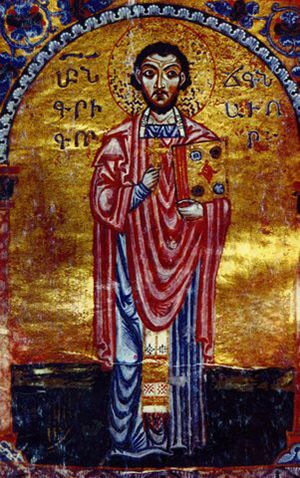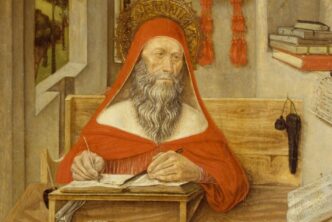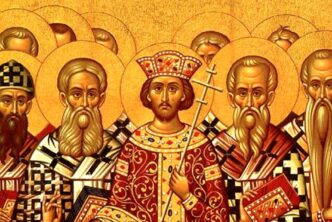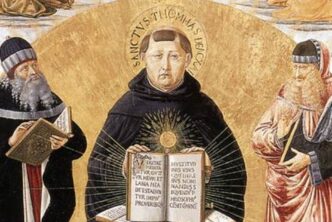This month in February we celebrate two Doctors of the Church: St. Peter Damian and St. Gregory of Narek.
St. Gregory of Narek (February 27)
 St. Gregory of Narek is the most recent Doctor of the Church to be recognized. Pope Francis named Gregory a Doctor in 2015. He was an Armenian Christian and has been venerated as a saint in the Armenian Apostolic Church and the Eastern Rite of the Catholic Church for centuries. Gregory, born around 951 and died in 1003, lived his life as a monk and was a noted poet, mystic, philosopher, composer, and theologian in present-day Turkey.
St. Gregory of Narek is the most recent Doctor of the Church to be recognized. Pope Francis named Gregory a Doctor in 2015. He was an Armenian Christian and has been venerated as a saint in the Armenian Apostolic Church and the Eastern Rite of the Catholic Church for centuries. Gregory, born around 951 and died in 1003, lived his life as a monk and was a noted poet, mystic, philosopher, composer, and theologian in present-day Turkey.
Pope Francis, in his usual style, raised some questions about recognizing this Christian saint whose church during his life was not in direct communion with Rome. Catholic theologian Dr. R. Jared Staudt describes the process by which Gegory came to be acknowledged as a Doctor in a 2015 article and the Holy Father followed the precedent of recognition of other Doctors. Staudt states regarding the process of equipollent or equivalent canonization:
It should be noted that when Pope Benedict XVI declared St. Hildegard von Bingen as a Doctor of Church he used the process of equipollent or equivalent canonization, as she also had not been formally canonized. Even St. Albert the Great was canonized in this fashion when he was declared a doctor of the Church in 1931 by Pope Pius XI. Pope Benedict used this process of canonization a few other times and Pope Francis has done so with even greater regularity, so much so, that Vatican Radio felt the need to explain the process:
“When there is strong devotion among the faithful toward holy men and women who have not been canonized, the Pope can choose to authorize their veneration as saints without going through that whole process. … This is often done when the saints lived so long ago that fulfilling all the requirements of canonization would be exceedingly difficult.”
From Andrea Tornielli’s commentary, referenced above, it seems likely that an equipollent canonization is forthcoming. Hopefully we will have clarification on this point soon. What is clear in the meantime is that there is a foundation for the equipollent canonization of saints in association with their being named a Doctor of the Church and there is a longstanding practice of celebrating St. Gregory of Narek’s feast day within the Armenian Catholic Church.
We currently don’t have any resources in Verbum we can share with you, but St. Gregory’s feast day in the Eastern liturgy is celebrated on October 13 and we are aiming to have some of his works available later in the year, hopefully in time for his feast.
St. Peter Damian (February 21)
 St. Peter Damian was a Benedictine monk, a cardinal under Pope Leo IX, a bishop of Ostia and was recognized by the poet Dante as inhabiting one of the highest levels of his Paradiso. He was born around 1007 and died February in 1072 or 1073. St. Peter was blessed with a reforming zeal, and upon abandoning his secular career and seeking a monastic life, he avoided the more luxurious monastery of Cluny and opted for a more primitive life as a hermit. While a disciplined and zealous monk, he also recognized the practical needs of the body–in true Benedictine fashion–by prescribing a daily siesta to balance the short night of sleep the monks typically got.
St. Peter Damian was a Benedictine monk, a cardinal under Pope Leo IX, a bishop of Ostia and was recognized by the poet Dante as inhabiting one of the highest levels of his Paradiso. He was born around 1007 and died February in 1072 or 1073. St. Peter was blessed with a reforming zeal, and upon abandoning his secular career and seeking a monastic life, he avoided the more luxurious monastery of Cluny and opted for a more primitive life as a hermit. While a disciplined and zealous monk, he also recognized the practical needs of the body–in true Benedictine fashion–by prescribing a daily siesta to balance the short night of sleep the monks typically got.
St. Peter Damian was never formally canonized, similar to Gregory of Narek, Albert the Great, and Julian of Norwich, as the Catholic News Agency states:
Never formally canonized, St. Peter Damian was celebrated as a saint after his death in many of the places associated with his life. In 1823, Pope Leo XII named him a Doctor of the Church and extended the observance of his feast day throughout the Western Church.
Unlike Gregory of Narek right now, we do offer several resources by St. Peter Damian. The letters of St. Peter are contained in the 15 volumes of the Fathers of the Church: Medieval Continuation collection. This not only contains 180 letters by St. Peter Damian, but it also contains sermons by St. Thomas Aquinas, a commentary on Romans by Peter Abelard, and a treatise on Aristotle’s Categories by John Duns Scotus.
You can check out all of the February deals for Verbum here.






I checked out the Interactive tool for “Feasts…” and found that it does not cite any of the deutero-canonicals or apocrypha*. Because this tool doesn’t, for whatever reason, it is not completely useful for scripture scholars. The same may be true for other interactive tools as a result of Logos/Verbum policy. The matter should be revisited.
*perhaps none are actually to be found; however, in principle, the matter should be checked out.